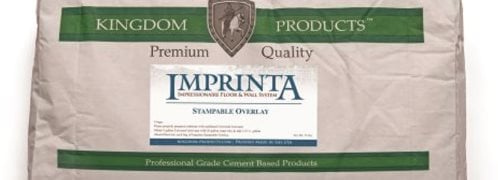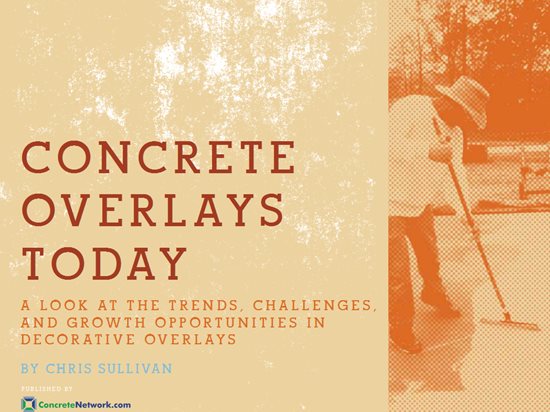- Concrete Overlays Home
- Get the Look - Interior Overlay Pictures
- When to Use a Polymer Overlay
- Comparison Chart of Overlay Systems: Which is best for your project?
- Five Factors to Consider when Choosing a Resurfacing System
- Concrete Overlay Reviews
- Types of Overlays
- Epoxy Coatings
- Microtoppings & Skim Coats
- Self-Leveling Overlays
- Spray-Down Toppings
- Polishable Overlays
- Stamped Concrete Overlays
- Preparing Concrete for Resurfacing
- Concrete Resurfacing
- Reducing Bond Failures Caused by Moisture-Vapor Transmission
- Don't Let Water Vapor Delaminate Your Overlay: How to seal concrete before an overlay
- How-To Tips for Installing Concrete Overlays
- Answers to Common Questions About Concrete Overlays: Advice from expert Chris Sullivan
- How to Add Color to Concrete Overlays
- How to Protect and Maintain Resurfaced Concrete
- Overlay Tools: Seven essential tools for concrete resurfacing
- Related Information
- Concrete Overlay Videos, with Bob Harris
- Decorative Concrete Overlays: A primer of the various overlay types and the decorative possibilities with each
- Vertical Concrete Overlays: Lightweight cement-based overlays mimic stone, brick, and other wall textures
Stampable Overlays
Advances in technology and application techniques have contributed to improved quality and new design possibilitiesThis is an excerpt from the new e-book “Concrete Overlays Today,” part of a series of reports from ConcreteNetwork.com on trends and insights about decorative concrete applications.
Free E-book:
Concrete Stamping Today
Discover seven rising trends in the overlay industry from ConcreteNetwork.com’s new e-book. You’ll get insights and advice from veteran overlay installers that will help you find success in today’s market.
Download Concrete Overlays Today (PDF)
Stampable overlays, or thick-section toppings, are the one decorative overlay market that is not experiencing rapid growth. A combination of economic pressure and technical demand has contributed to the slow decline. “The price point of stamped concrete has caught up [to stamped overlays],” says Trevor Foster, western sales manager with Miracote Products. Over the last decade, stamped concrete has seen a slow decline in price and an overall increase in quality. This trend has negatively affected the stamped overlay market. In many instances, it has become more cost-effective to rip out and replace a concrete slab with stamped concrete than to apply a stampable overlay.
Stampable overlays also require a high degree of technical expertise to install, more so than any other decorative overlay. Because of the thicker build (1/4 inch to ½ inch), they require more attention to detail in regard to surface preparation, application and maintenance. Stamped overlays often require aggressive mechanical surface preparation, along with the use of specialty primers. This costs money and takes time, which in some cases makes the price of installing the overlay prohibitive. The mentality of “just overlay it” that permeated the market in the mid-2000s has really hurt stampable overlays. There were many failures, which to this day negatively affect the overlay industry.
However, the news is not all negative. Advances in technology and application techniques have contributed to a better product overall and higher-quality installations with greater durability. The trend in stamped overlays today is the same as with microtoppings -- simple, clean, and natural. Light earth-tone colors, such as tans, light browns, and beiges, are popular as are simple stone patterns using cleaner and lighter textures. Another trend is post coloring, which involves applying a stamped overlay in a neutral color then coming back and lightly highlighting the work to accentuate the texture in a very realistic manner.
One company seeing an increase in their stamped overlay business because of the trend toward custom coloring is Decorative Concrete Resurfacing, Ballwin, Mo. “We have been offering custom stampable overlay finishes for a few years, and it now makes up 20% of our business,” says company vice president Lisa O’Hern. While it is popular and a growing part of their business, it does come with some barriers. “We find that cost is an issue. Because of the additional labor and cost involved in creating these high-end finishes, many customers can’t afford it,” she says.
The ability to control the final color is a real advantage of stampable overlays, especially with the use of lighter colors, which contribute to U.S. Green Building Council LEED points on green projects. Design flexibility and color control also go a long way to realizing an architect’s or homeowner’s design goals.
The latest trend in stamped overlays is to go vertical. Special stampable overlay materials are now available that stay in place on vertical wall surfaces and remain pliable for long periods of time, allowing for custom carving and stamping to replicate the look of natural rock and stone formations. These overlays have become viable alternatives on projects where natural stone cannot be installed because of economics or logistics. Although this new application for stampable overlays is still getting its legs, the quality of work and reception in the marketplace points to a bright future.
Related information:
Where to Get Color Inspiration
Concrete Overlays
Return to Concrete Overlays Today
 Rapid Set Skim Coat
Repairs, levels, and smooths concrete for applications.
Rapid Set Skim Coat
Repairs, levels, and smooths concrete for applications.
 Thin Micro-Topping
Produces durable surface to color or stain
Thin Micro-Topping
Produces durable surface to color or stain
 Self Leveling Overlay
Find the overlay to meet your project's needs
Self Leveling Overlay
Find the overlay to meet your project's needs
 T1000 Stampable Overlay
For use with resurfacing concrete floors and hardscapes.
T1000 Stampable Overlay
For use with resurfacing concrete floors and hardscapes.
 Kemiko® Buildable Overlay
Decorative interior or exterior resurfacing
Kemiko® Buildable Overlay
Decorative interior or exterior resurfacing
 Flooring & Coating System
Epoxy Flooring System designed for concrete
Flooring & Coating System
Epoxy Flooring System designed for concrete
 Stamped Concrete Overlay
Warm weather and cold weather formulas
Stamped Concrete Overlay
Warm weather and cold weather formulas
 Imprinta Stampable Overlay
2-component system
Imprinta Stampable Overlay
2-component system





